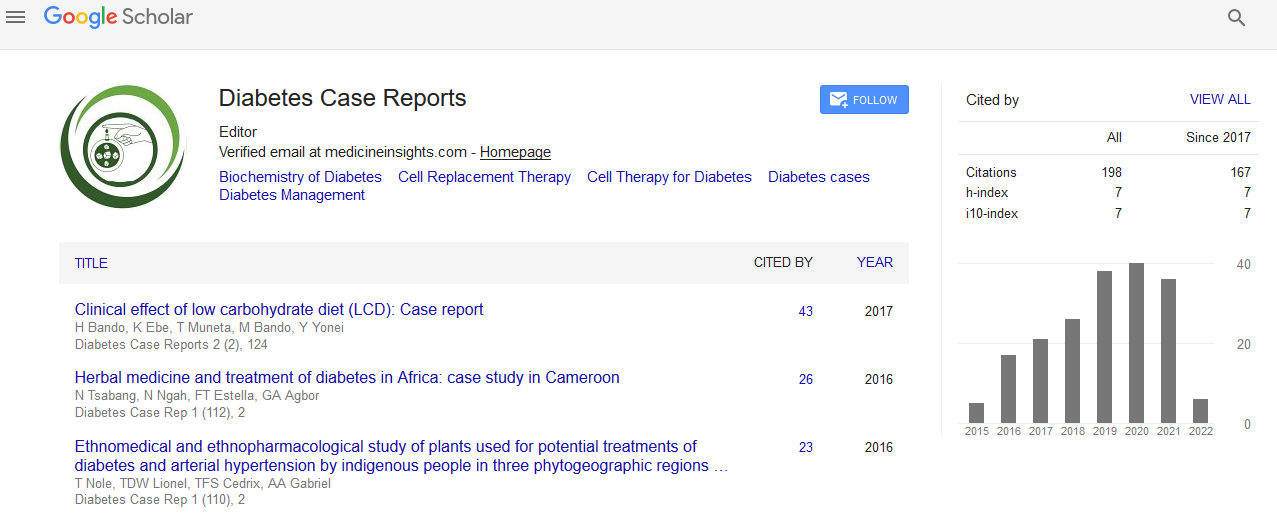Indexed In
- RefSeek
- Hamdard University
- EBSCO A-Z
- Euro Pub
- Google Scholar
Useful Links
Share This Page
Journal Flyer

Open Access Journals
- Agri and Aquaculture
- Biochemistry
- Bioinformatics & Systems Biology
- Business & Management
- Chemistry
- Clinical Sciences
- Engineering
- Food & Nutrition
- General Science
- Genetics & Molecular Biology
- Immunology & Microbiology
- Medical Sciences
- Neuroscience & Psychology
- Nursing & Health Care
- Pharmaceutical Sciences
Commentary - (2023) Volume 8, Issue 5
Impact of Smoking on Diabetic Individuals and Health Benefits of Cessation
Thomas Robertson*Received: 04-Sep-2023, Manuscript No. DCRS-23-23406; Editor assigned: 07-Sep-2023, Pre QC No. DCRS-23-23406(PQ); Reviewed: 21-Sep-2023, QC No. DCRS-23-23406; Revised: 28-Sep-2023, Manuscript No. DCRS-23-23406(R); Published: 05-Oct-2023, DOI: 10.35841/2572-5629.23.8.180
Description
Smoking is a major risk factor for Type 2 Diabetes Mellitus (T2DM) and can lead to complications such as cardiovascular disease, neuropathy, and nephropathy. Smoking cessation is an essential component of diabetes management and can help reduce the risk of complications. Smoking is associated with an increased risk of macrovascular and microvascular complications in patients with diabetes. Smokers with diabetes have a higher risk of mortality than non-smokers with diabetes. Smoking also increases blood pressure and alters lipid profiles in smokers with diabetes, which could encourage the development of insulin resistance syndrome, leading to further cardiovascular problems.
Benefits for quitting smoking
Improved blood sugar control: Smoking cessation can lead to better blood sugar control, making it easier to manage diabetes and reduce the risk of complications.
Reduced cardiovascular risk:Quitting smoking lowers the risk of heart disease, stroke, and other cardiovascular complications, which are already elevated in people with diabetes.
Slower progression of complications: Quitting smoking can slow down the progression of microvascular complications such as diabetic nephropathy and retinopathy.
Enhanced lung function: Lung function improves after quitting smoking, which is especially important for individuals with diabetes, as lung function can be compromised due to diabetic lung complications.
Increased life expectancy: Smoking cessation can significantly increase life expectancy in individuals with diabetes by reducing the risk of premature death associated with smoking-related illnesses.
Hence, it is advisable to provide smoking cessation programs to individuals with diabetes. Smoking cessation can be challenging for people with T2DM due to unique problems such as post- cessation weight gain and depression. However, the potentialbenefits of smoking cessation are considerable. Studies have shown that smoking cessation can lead to better control of blood sugar levels in people with diabetes. Insulin can become more effective at lowering blood sugar levels eight weeks after a smoker quits. Smoking cessation also reduces the risk of cardiovascular disease incidence, all-cause mortality, and CVD mortality among T2DM patients. Smoking cessation programs should use behavioral change methods to devise specific strategies for smoking cessation and to prevent unique problems such as post-cessation weight gain and depression. Varieties of medications are available to clinicians advising smoking cessation for patients with diabetes. Bupropion could be considered a viable option due to its antidepressant properties and potential to mitigate weight gain. Nonetheless, some patients may favor the convenience of specific nicotine replacement methods. While the benefits of quitting smoking for those with type 2 diabetes are clear, the process of smoking cessation can be challenging. Several factors contribute to these difficulties like Nicotine, the addictive substance in cigarettes; can make it hard for individuals to quit smoking. Some individuals with diabetes turn to smoking as a way to cope with the stress and emotional challenges associated with diabetes management. People with diabetes may worry about weight gain after quitting smoking, as nicotine can suppress appetite and increase metabolism.
Conclusion
Smoking cessation is a critical step for individuals with type 2 diabetes to improve their health and reduce the risk of diabetes related complications. While quitting smoking can be challenging due to nicotine addiction, stress, and weight concerns, it is a objective value for pursuing. Behavioral support, pharmacotherapy, and diabetes management adjustments are essential components of a successful smoking cessation plan. By quitting smoking, individuals with type 2 diabetes can enhance their blood sugar control, reduce cardiovascular risks, and slow down the progression of diabetes-related complications. Ultimately, this decision can lead to a longer and healthier life, free from the adverse effects of smoking. Healthcare providers and support networks play a pivotal role in guiding andencouraging individuals with diabetes on their journey to becoming smoke-free, thereby achieving better overall health and well-being.
Citation: Robertson T (2023) Impact of Smoking on Diabetic Individuals and Health Benefits of Cessation. Diabetes Case Rep. 8:180.
Copyright: © 2023 Robertson T. This is an open-access article distributed under the terms of the Creative Commons Attribution License, which permits unrestricted use, distribution, and reproduction in any medium, provided the original author and source are credited.

